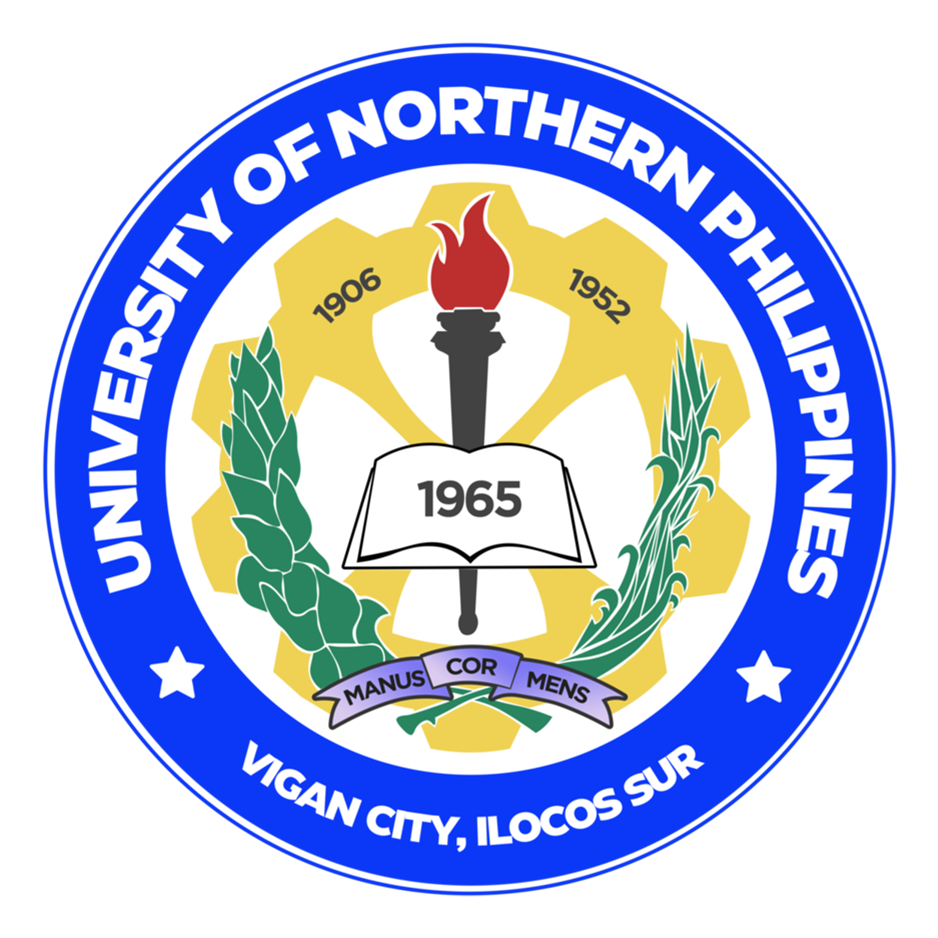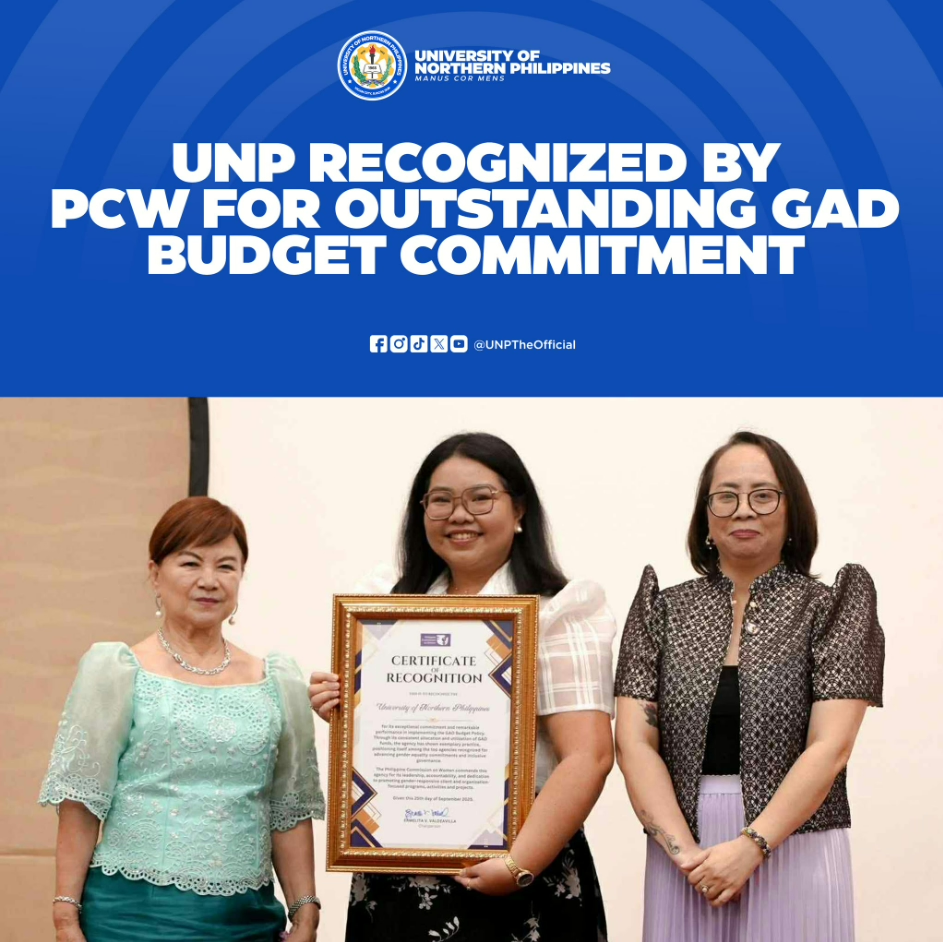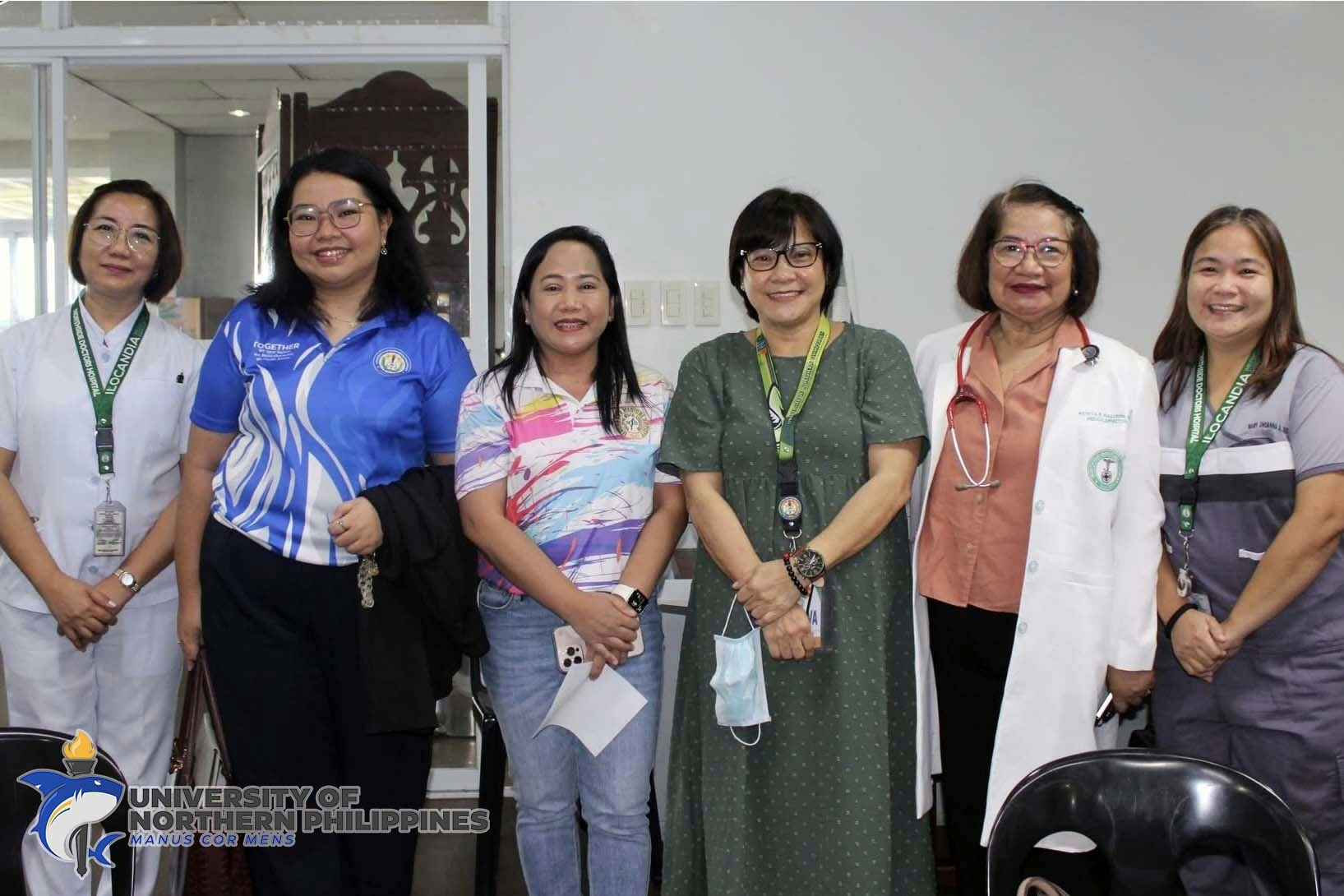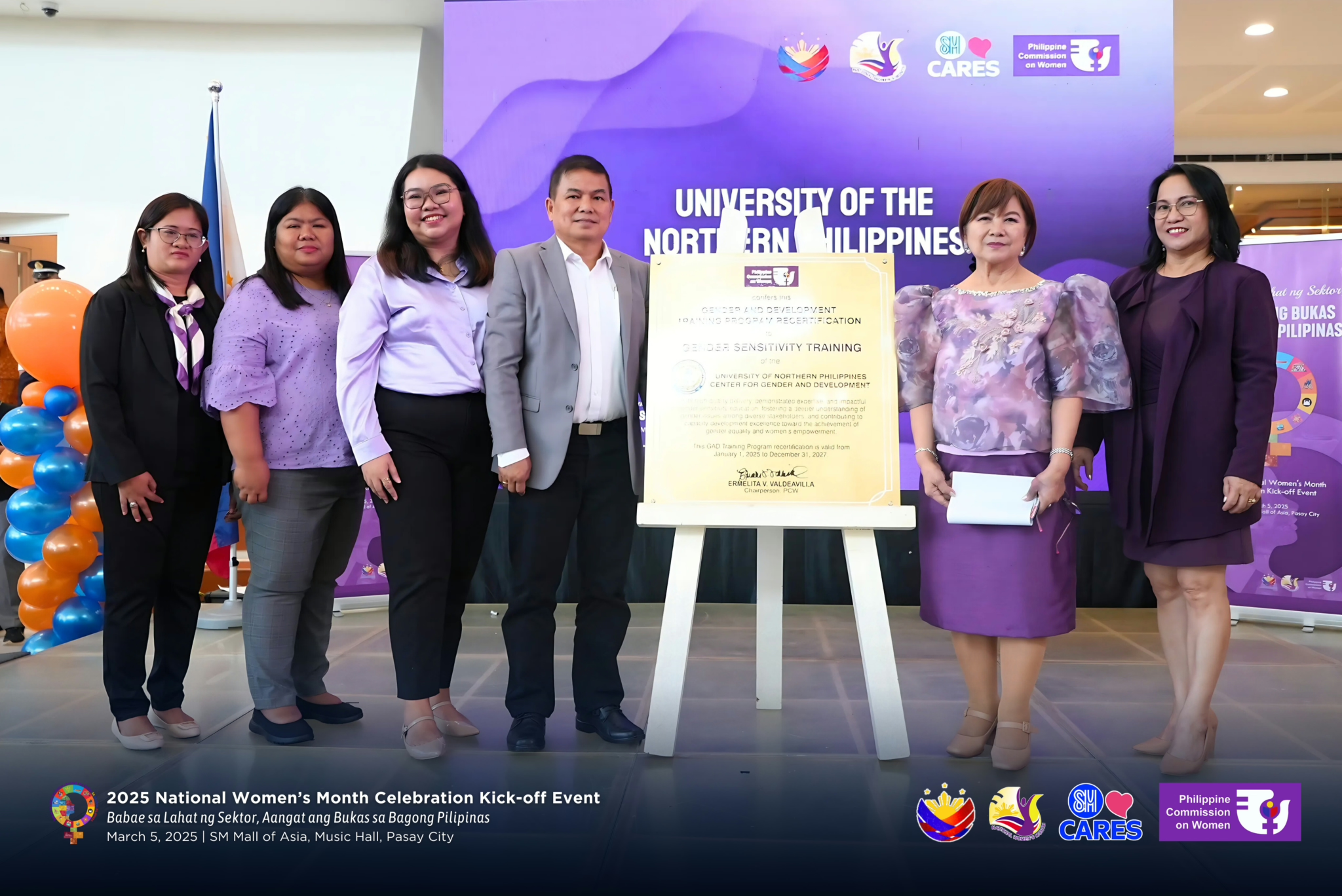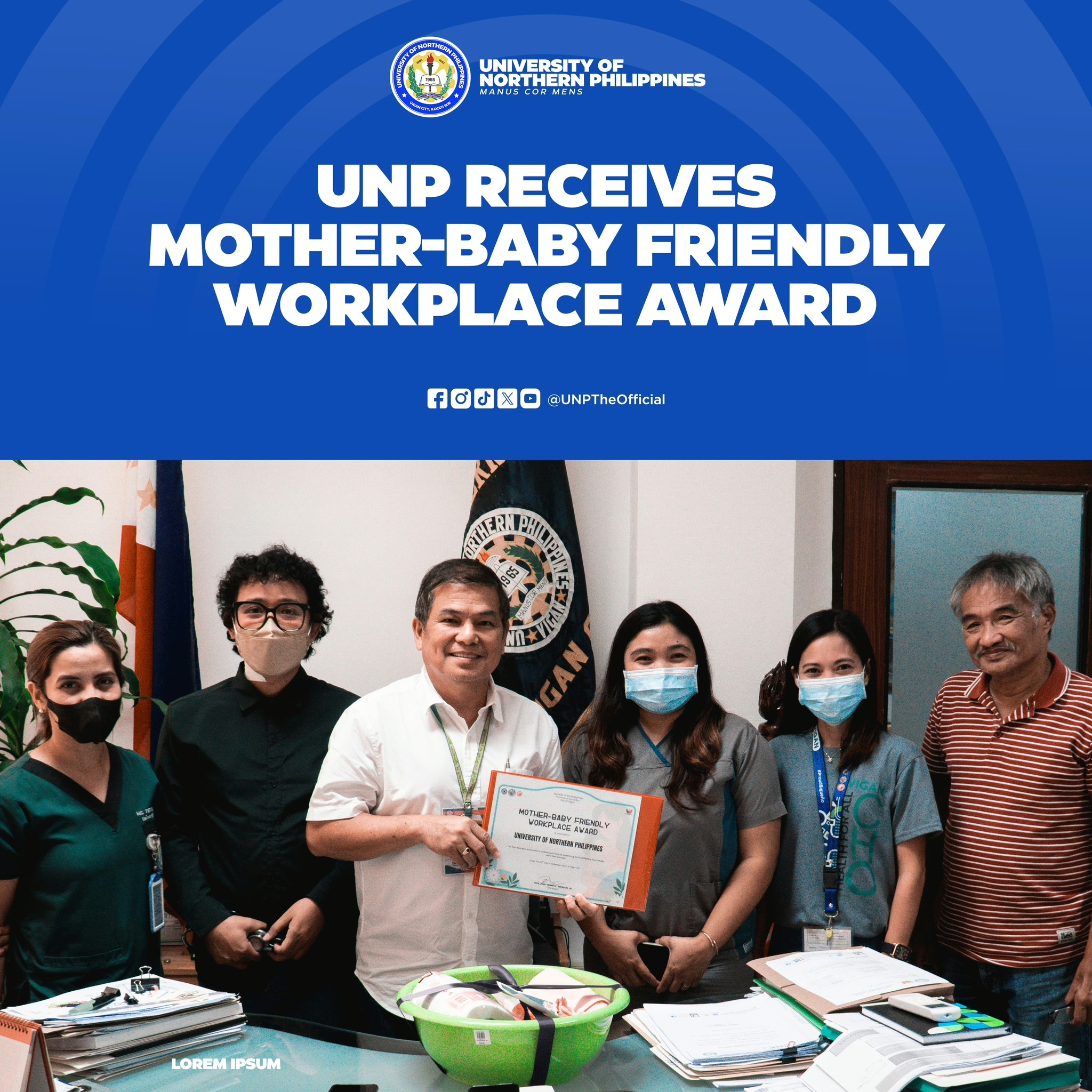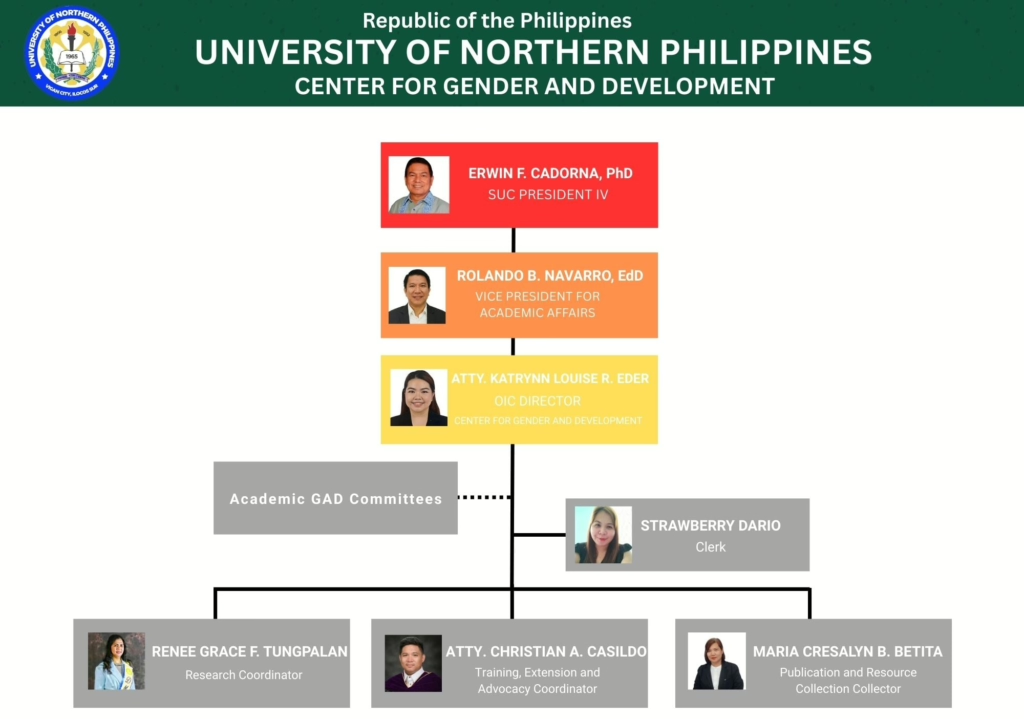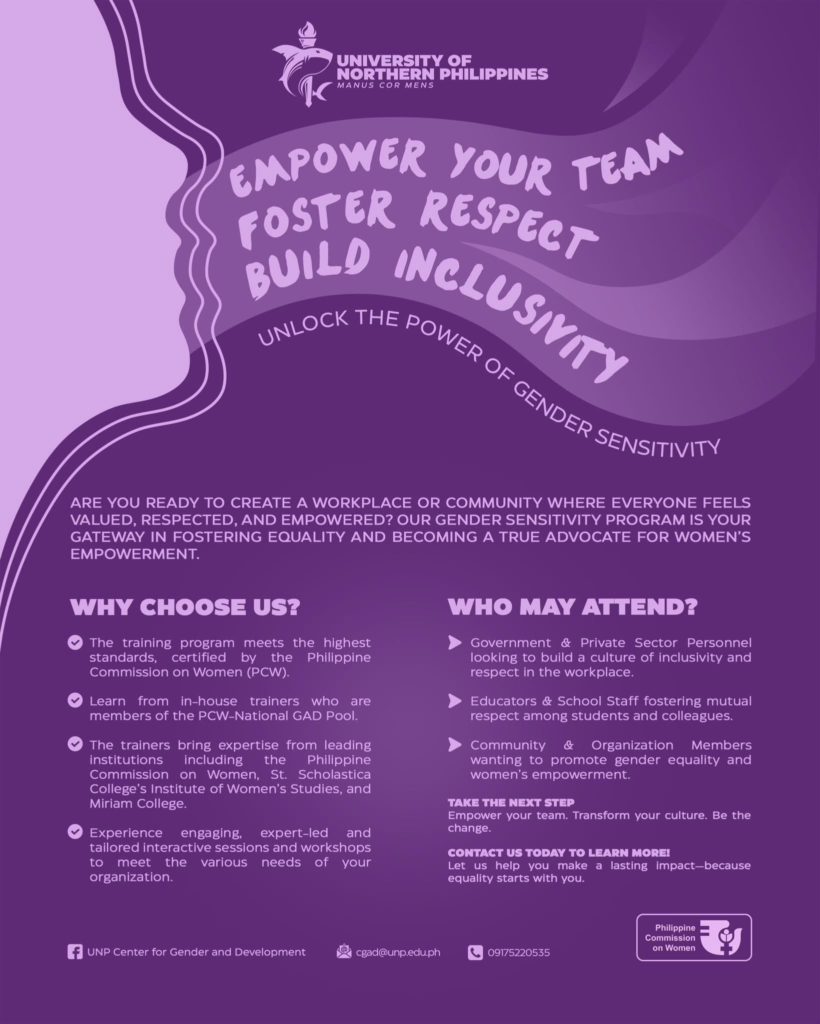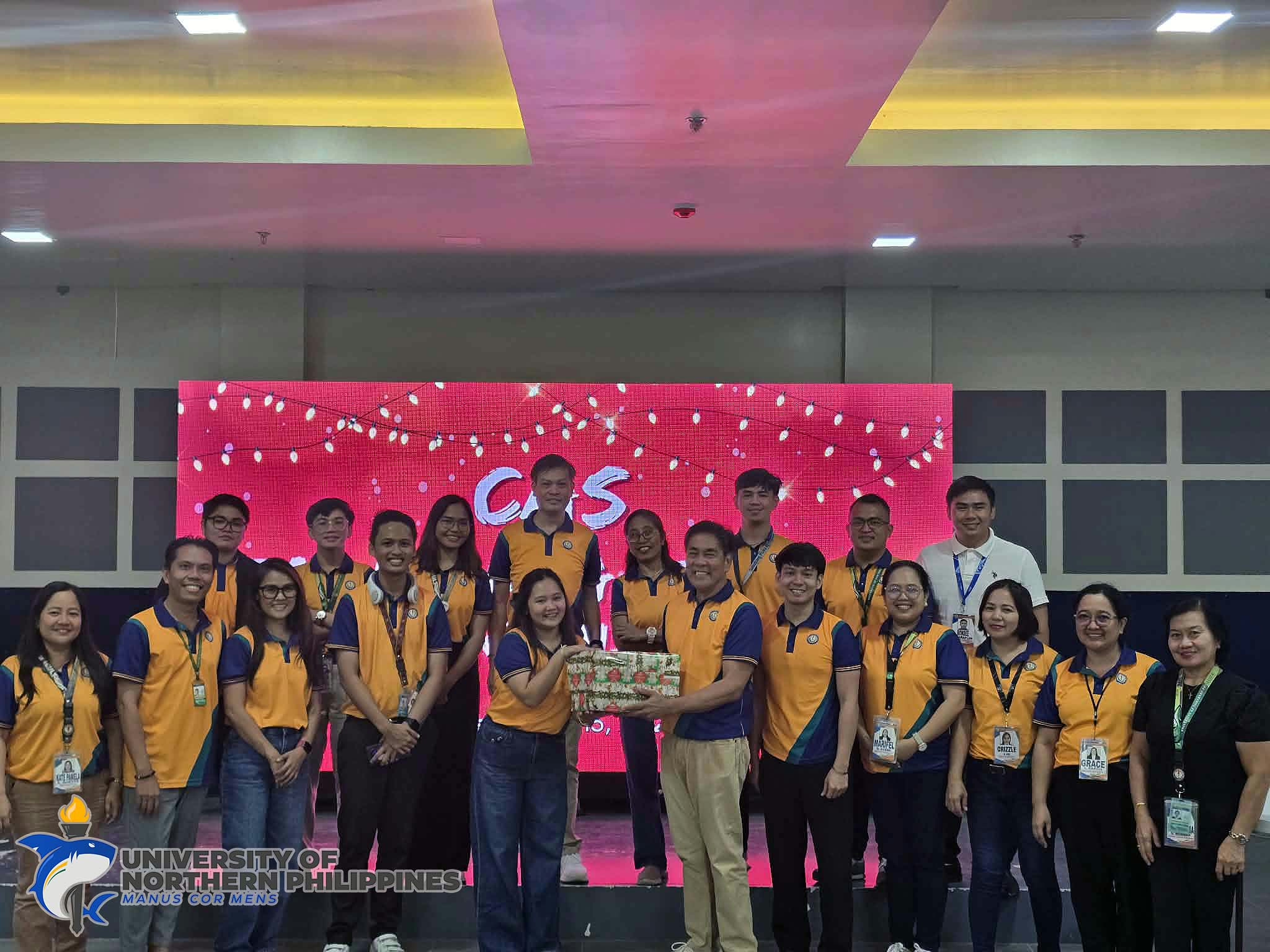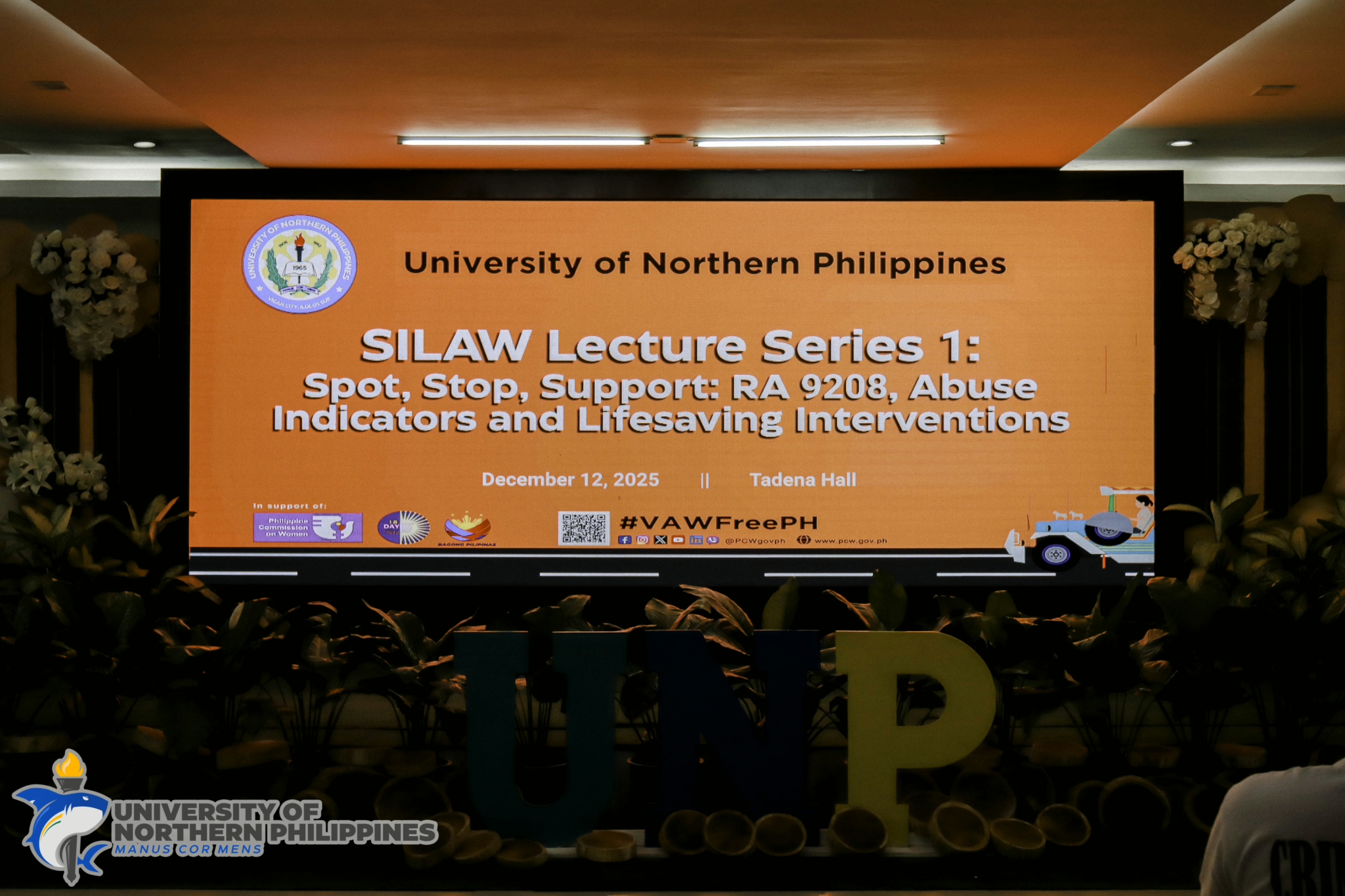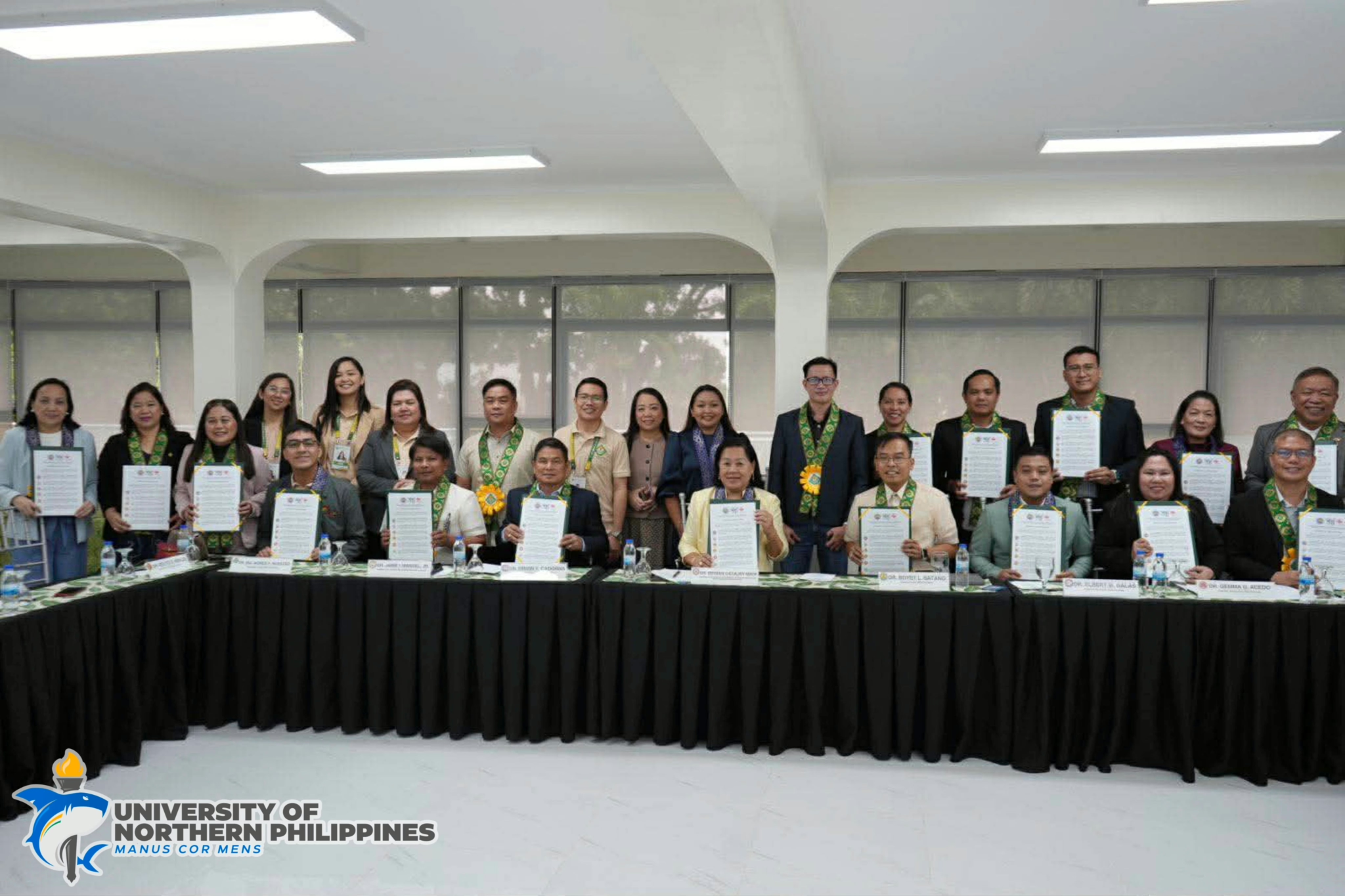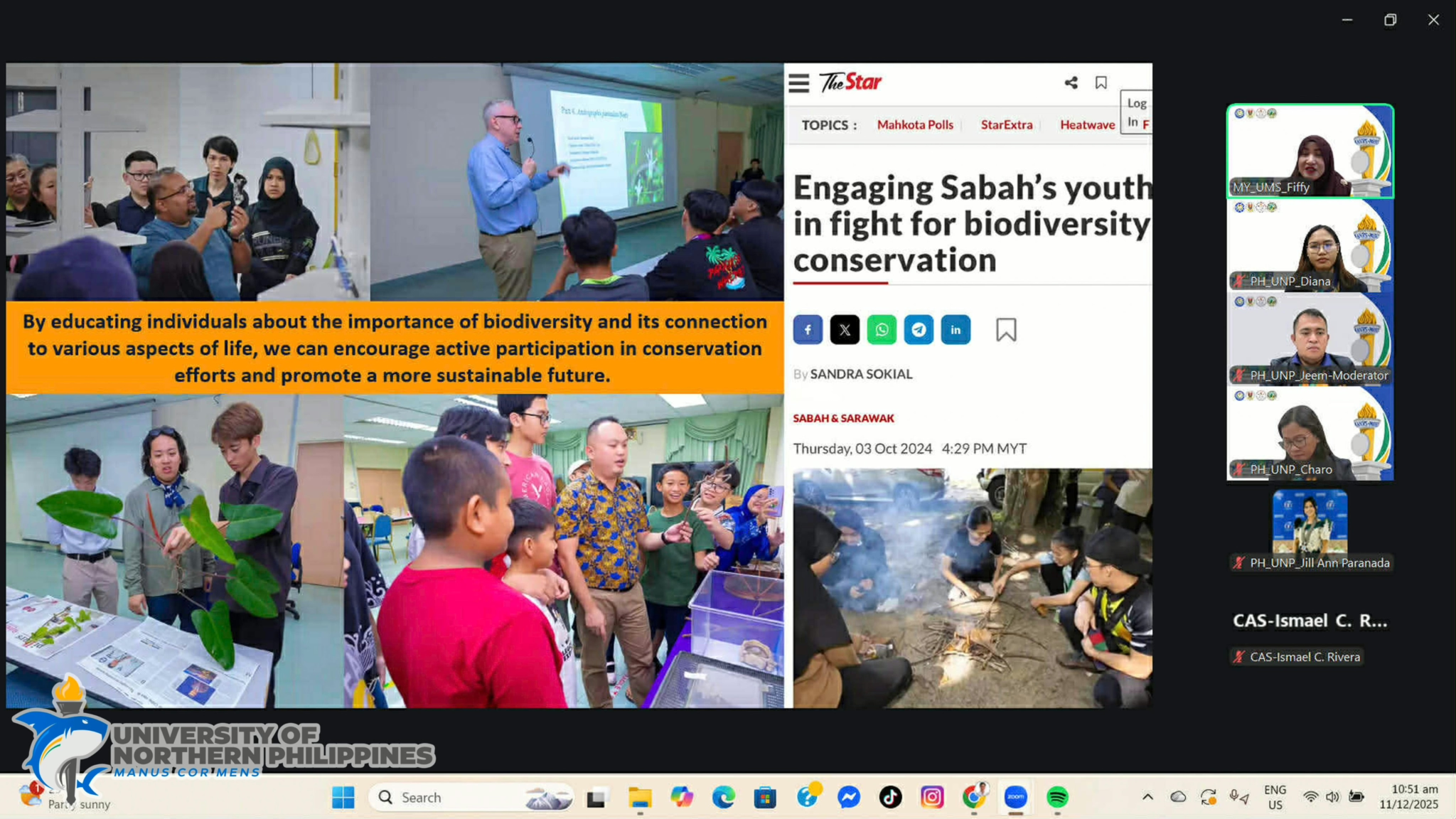Gender and Development (GAD) Corner
Highlights
The University of Northern Philippines recognizes gender equality as a fundamental human right that deserves to be echoed not only within the corners of the University but also in our community and everywhere in the world. Our institution has taken a proactive stance in its role as a duty-bearer in advocating for gender and development and women empowerment.
In order to realize the university’s commitment to the government’s call for the promotion for gender equality, and to streamline the gender mainstreaming efforts of the University, the Center for Gender and Development (CGAD) was created on June 5, 1997 through Board Resolution No. 55, series of 1997. The Center embraces its trifocal function: to mainstream gender and development along three key areas namely instruction, research, and extension, in an effort to implement the provisions of CHED Memorandum Order No. 1 (CMO No. 1, s.2015).
Furthermore, in response to the Magna Carta of Women of 2009 and CMO 1, s.2015, the UNP GAD Focal Point System (GFPS) was organized in 2013. Other mechanisms were also established such as the creation of the Committee on Decorum and Investigation, the inclusion of the CGAD in the University Code, the formulation of the five-year Gender and Development Agenda (GAD Agenda 2020-2025), annual submission of GAD Plan and Budget and utilization of the GAD Budget. The UNP GAD Focal Point System has also led the formulation of GAD Policies including Policies on Gender-Responsive Curriculum/Instruction, Gender-Responsive Extension Programs, and Gender-Responsive Research Programs, which are now in full force.
The University has also established partnerships with several institutions – national and local, a welcome development that serves to strengthen its gender mainstreaming advocacy. The most notable among these partnerships is that with the Philippine Commission on Women (PCW) where a Partnership Agreement was forged regarding the provision of the University of its very own PCW-Certified Gender Sensitivity Training Program to requesting government agencies and other entities, private institutions, and individuals.
In its pursuance of its mandate to implement the Magna Carta of Women (Republic Act No. 9710, which is the local translation of the provisions of the United Nations CEDAW, the University pursues Gender and Development as one of the University’s 10 Development Goals. The University has taken significant strides in its advocacy for gender equality all in the hope for a future that celebrates diversity and inclusivity, and it will continue to do so with the continuous support of all academic units and offices, the community at large, and the government.
Profile
The CGAD is a unit that acts as the organizational umbrella for the mainstreaming of gender and development in the plans, programs and activities of the university. It serves as the link between government and non-government organizations (NGOs) in the province of Ilocos Sur regarding gender and development concerns.
The Center has the following components: Training, Extension and Advocacy, Research, Publication and Resource Collection.
The Center aims to institutionalize all efforts in mainstreaming gender and development in order or translate the university’s commitment the GAD agenda of the national government. With this goal, the CGAD serves as the link between the university and government line agencies, NGOs and the academic and funding institutions to realize the government’s program on gender and development concerns; mainstreams gender and development concerns in the function of the university: instruction, research and extension; strengthens institutional mechanism for the development of conceptual and technical skills needed for gender mainstreaming; plans and implements gender-responsive programs, projects and activities towards a gender fair-environment; links and networks with government agencies, the academe, civil society and funding institutions in order to enhance its capability in rendering efficient services to its varied clientele; serves as the locus interaction, resources and information for the gender mainstreaming efforts of the University; and reviews policies of the University to ensure implementation of programs which directly and indirectly affect women’s participation and those that work against gender bias.
Herstory
The Center for Gender and Development (CGAD) was created at the University of Northern Philippines through Board Resolution No. 55, series of 1997, approved on June 5, 1997. It is a unit that acts as the organizational umbrella for the mainstreaming of gender and development in the plans, programs, and activities of the University.The Center was conceptualized as a response to the University’s commitment to the government’s mandate of mainstreaming gender on the national agenda. The global efforts in calling all sectors of society and mobilizing resources for the advancement of women have been enshrined in the Philippine government’s commitment to being a signatory to international conventions, particularly the UN Convention on the Elimination of All Forms of Discrimination Against Women (CEDAW) in 1979 and the UN Forward-Looking Strategies for the Advancement of Women (FLSAW) in 1985. These are further affirmed by the government’s commitment to implement the Beijing Platform for Action (BPfA) on Women, which was approved during the Fourth World Conference on Women in Beijing, China (FWCW) in 1995.
For its legal mandate, the following documents explicitly stipulate mainstreaming gender dimensions in the development process. Article II, Sec.14 of the 1987 Constitution states that “ the state recognizes the role of women in nation-building and shall ensure the fundamental equality before the law of men and women”; Executive Order 348, series of 1989, approving and adopting the Philippine Development Plan for Women (PDPW) for 1989-1992, a companion volume of the Medium Term Philippine Development Plan (MTPDP) 1989-1992; RA 7192, otherwise known as the Women in Development and Nation– Building Act and its Implementing Rules and Regulations (IRR) which specifically mandated the formulation of the Philippine Development Plan for Gender– Responsive Development (PPGD)1995-2025; and Executive Order 273 approving and adopting the PPGD signed on September 8, 1995.
UNP’s Gender Sensitivity Training Program
In 2022, the University of Northern Philippines has achieved a milestone like no other. Our Gender Sensitivity Training Program, being one of our best endeavors, became one of just four nationwide that have been shortlisted and approved by the Philippine Commission on Women (PCW), and our University was granted by the PCW a certification valid for two years for all shortlisted trainings pertaining to UNP’s Gender Sensitivity Training. This was a humbling yet welcome achievement for the University as the University has been providing Gender Sensitivity Trainings since 1997.
Last March 2025, the UNP’s GST Program was recertified by the PCW for another two years. Through our fruitful partnership with the PCW, we continue to be committed to the twin goals of gender equality and women’s empowerment. We have sustained our efforts to provide gender sensitivity trainings and technical assistance to our stakeholders – both internal and external: students, newly-hired faculty and non-teaching personnel, employees of requesting agencies, members of non-governmental organizations, and women and men in our adopted communities. Our partnership has enabled us to bring our advocacy to an even wider landscape, and has inspired us to continuously improve and assess our performance in order to ensure that our program is aligned with PCW’s core messages.
News and Programs
Gender and Development (GAD) in UNP
Center for Gender and Development (CGAD)
- Conduct training, extension, and advocacy
- Engage in research and publication
- Maintain a gender resource collection
- Review university policies for gender responsiveness
- Promote a gender-fair environment through responsive programs and activities
UNP’s GAD initiatives are grounded in:
- 1987 Constitution, Article II, Sec. 14
- RA 7192 (Women in Development and Nation-Building Act)
- RA 9710 (Magna Carta of Women)
- Executive Orders 348 & 273
- Philippine Development Plan for Gender-Responsive Development (PPGD) 1995–2025
- CEDAW, FLSAW, and the Beijing Platform for Action
Created in 2013, the GFPS leads GAD policy development and implementation, including:
- GAD-Responsive Curriculum, Research, and Extension
- GAD Plan & Budget (Annual)
- Five-Year GAD Agenda (2020–2025)
- Committee on Decorum and Investigation (CODI)
UNP’s Gender Sensitivity Training Program (GSTP), in partnership with the Philippine Commission on Women (PCW), is PCW-certified and among only four such programs nationwide. Recertified in March 2025, it provides gender training and technical assistance to students, staff, external agencies, NGOs, and communities.
UNP continues to strengthen gender advocacy through:
- Strong institutional mechanisms
- National and local partnerships
- Academic integration of GAD principles
- Continuous training and community engagement
Legal & Policy Foundations
UNP’s GAD initiatives are grounded in:
- 1987 Constitution, Article II, Sec. 14
- RA 7192 (Women in Development and Nation-Building Act)
- RA 9710 (Magna Carta of Women)
- Executive Orders 348 & 273
- Philippine Development Plan for Gender-Responsive Development (PPGD) 1995–2025
- CEDAW, FLSAW, and the Beijing Platform for Action
UNP GAD Focal Point System (GFPS)
Created in 2013, the GFPS leads GAD policy development and implementation, including:
- GAD-Responsive Curriculum, Research, and Extension
- GAD Plan & Budget (Annual)
- Five-Year GAD Agenda (2020–2025)
- Committee on Decorum and Investigation (CODI)
Certified Gender Sensitivity Training Program
UNP’s Gender Sensitivity Training Program (GSTP), in partnership with the Philippine Commission on Women (PCW), is PCW-certified and among only four such programs nationwide. Recertified in March 2025, it provides gender training and technical assistance to students, staff, external agencies, NGOs, and communities.
Ongoing Advocacy
UNP continues to strengthen gender advocacy through:
- Strong institutional mechanisms
- National and local partnerships
- Academic integration of GAD principles
- Continuous training and community engagement
CGAD Functions
- Conduct training, extension, and advocacy
- Engage in research and publication
- Maintain a gender resource collection
- Review university policies for gender responsiveness
- Promote a gender-fair environment through responsive programs and activities
Legal & Policy Foundations
UNP’s GAD initiatives are grounded in:
- 1987 Constitution, Article II, Sec. 14
- RA 7192 (Women in Development and Nation-Building Act)
- RA 9710 (Magna Carta of Women)
- Executive Orders 348 & 273
- Philippine Development Plan for Gender-Responsive Development (PPGD) 1995–2025
- CEDAW, FLSAW, and the Beijing Platform for Action
UNP GAD Focal Point System (GFPS)
Created in 2013, the GFPS leads GAD policy development and implementation, including:
- GAD-Responsive Curriculum, Research, and Extension
- GAD Plan & Budget (Annual)
- Five-Year GAD Agenda (2020–2025)
- Committee on Decorum and Investigation (CODI)
Certified Gender Sensitivity Training Program
UNP’s Gender Sensitivity Training Program (GSTP), in partnership with the Philippine Commission on Women (PCW), is PCW-certified and among only four such programs nationwide. Recertified in March 2025, it provides gender training and technical assistance to students, staff, external agencies, NGOs, and communities.
Ongoing Advocacy
UNP continues to strengthen gender advocacy through:
- Strong institutional mechanisms
- National and local partnerships
- Academic integration of GAD principles
- Continuous training and community engagement
